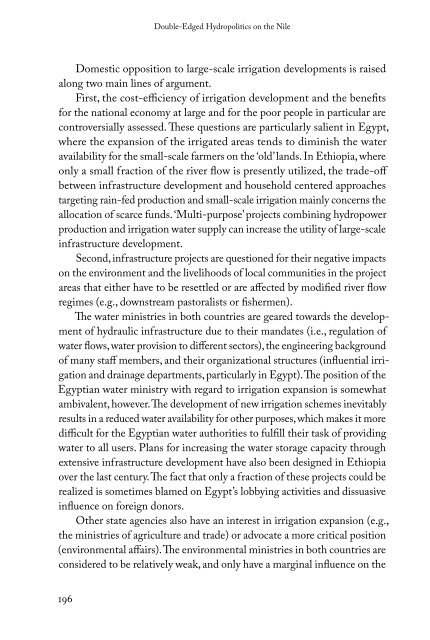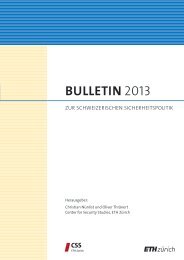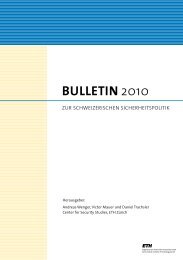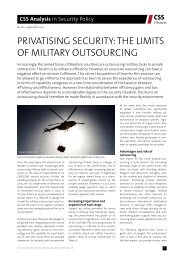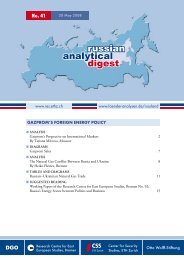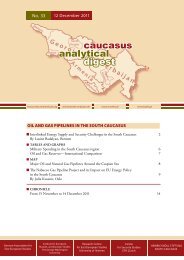Double-Edged Hydropolitics on the Nile - Center for Security Studies ...
Double-Edged Hydropolitics on the Nile - Center for Security Studies ...
Double-Edged Hydropolitics on the Nile - Center for Security Studies ...
Create successful ePaper yourself
Turn your PDF publications into a flip-book with our unique Google optimized e-Paper software.
<str<strong>on</strong>g>Double</str<strong>on</strong>g>-<str<strong>on</strong>g>Edged</str<strong>on</strong>g> <str<strong>on</strong>g>Hydropolitics</str<strong>on</strong>g> <strong>on</strong> <strong>the</strong> <strong>Nile</strong><br />
Domestic oppositi<strong>on</strong> to large-scale irrigati<strong>on</strong> developments is raised<br />
al<strong>on</strong>g two main lines of argument.<br />
First, <strong>the</strong> cost-efficiency of irrigati<strong>on</strong> development and <strong>the</strong> benefits<br />
<strong>for</strong> <strong>the</strong> nati<strong>on</strong>al ec<strong>on</strong>omy at large and <strong>for</strong> <strong>the</strong> poor people in particular are<br />
c<strong>on</strong>troversially assessed. These questi<strong>on</strong>s are particularly salient in Egypt,<br />
where <strong>the</strong> expansi<strong>on</strong> of <strong>the</strong> irrigated areas tends to diminish <strong>the</strong> water<br />
availability <strong>for</strong> <strong>the</strong> small-scale farmers <strong>on</strong> <strong>the</strong> ‘old’ lands. In Ethiopia, where<br />
<strong>on</strong>ly a small fracti<strong>on</strong> of <strong>the</strong> river flow is presently utilized, <strong>the</strong> trade-off<br />
between infrastructure development and household centered approaches<br />
targeting rain-fed producti<strong>on</strong> and small-scale irrigati<strong>on</strong> mainly c<strong>on</strong>cerns <strong>the</strong><br />
allocati<strong>on</strong> of scarce funds. ‘Multi-purpose’ projects combining hydropower<br />
producti<strong>on</strong> and irrigati<strong>on</strong> water supply can increase <strong>the</strong> utility of large-scale<br />
infrastructure development.<br />
Sec<strong>on</strong>d, infrastructure projects are questi<strong>on</strong>ed <strong>for</strong> <strong>the</strong>ir negative impacts<br />
<strong>on</strong> <strong>the</strong> envir<strong>on</strong>ment and <strong>the</strong> livelihoods of local communities in <strong>the</strong> project<br />
areas that ei<strong>the</strong>r have to be resettled or are affected by modified river flow<br />
regimes (e.g., downstream pastoralists or fishermen).<br />
The water ministries in both countries are geared towards <strong>the</strong> development<br />
of hydraulic infrastructure due to <strong>the</strong>ir mandates (i.e., regulati<strong>on</strong> of<br />
water flows, water provisi<strong>on</strong> to different sectors), <strong>the</strong> engineering background<br />
of many staff members, and <strong>the</strong>ir organizati<strong>on</strong>al structures (influential irrigati<strong>on</strong><br />
and drainage departments, particularly in Egypt). The positi<strong>on</strong> of <strong>the</strong><br />
Egyptian water ministry with regard to irrigati<strong>on</strong> expansi<strong>on</strong> is somewhat<br />
ambivalent, however. The development of new irrigati<strong>on</strong> schemes inevitably<br />
results in a reduced water availability <strong>for</strong> o<strong>the</strong>r purposes, which makes it more<br />
difficult <strong>for</strong> <strong>the</strong> Egyptian water authorities to fulfill <strong>the</strong>ir task of providing<br />
water to all users. Plans <strong>for</strong> increasing <strong>the</strong> water storage capacity through<br />
extensive infrastructure development have also been designed in Ethiopia<br />
over <strong>the</strong> last century. The fact that <strong>on</strong>ly a fracti<strong>on</strong> of <strong>the</strong>se projects could be<br />
realized is sometimes blamed <strong>on</strong> Egypt’s lobbying activities and dissuasive<br />
influence <strong>on</strong> <strong>for</strong>eign d<strong>on</strong>ors.<br />
O<strong>the</strong>r state agencies also have an interest in irrigati<strong>on</strong> expansi<strong>on</strong> (e.g.,<br />
<strong>the</strong> ministries of agriculture and trade) or advocate a more critical positi<strong>on</strong><br />
(envir<strong>on</strong>mental affairs). The envir<strong>on</strong>mental ministries in both countries are<br />
c<strong>on</strong>sidered to be relatively weak, and <strong>on</strong>ly have a marginal influence <strong>on</strong> <strong>the</strong><br />
196


